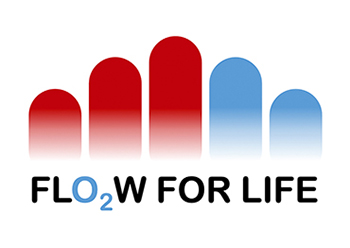FLOW FOR LIFE
The goal of the LOEWE research cluster FLOW FOR LIFE is to develop an artificial network that transports oxygen and nutrients within lab-grown human tissue of a centimeter size scale. Combining engineering with biological principles, and synthetic with biological materials, the project brings together experts and infrastructure from five engineering and natural science departments at the TU Darmstadt.

Listen to “Flow”
composed and produced by Carlos Eiene
Why we teamed up
Organ-like three-dimensional cell aggregates developed in the laboratory represent versatile cellular models for drug development and toxicology assessment and hold great promise for regenerative medicine. They have the potential to serve as an alternative to donated human tissue and to reduce animal testing. Already the smallest functional units in tissues of the human body, such as hepatic lobules, are of diameters larger than one millimeter. Organ-like three-dimensional structures of multiple millimeters to centimeter size require a vascular system perfusing them.
The limits of diffusion
Tissue needs to be continuously supplied with oxygen and nutrients, whereas metabolic products must be removed. This is essential for cells to stay viable and functional. As diffusion of oxygen within tissue is limited, cell aggregates of multiple millimeters thickness cannot be simply supplied by an outside liquid medium. In the human body, the vasculature serves as a transport system and each cell is typically no further than 200 µm away from the next blood vessel.
Industrial partners
We collaborate with Merck Healthcare KGaA, which is providing expertise in investigative toxicology and advanced cell models, B. Braun Avitum AG with know-how in blood-compatible hollow fibres, and Fresenius Medical Care-Unicyte, which is advising us on regenerative medicine requirements.







